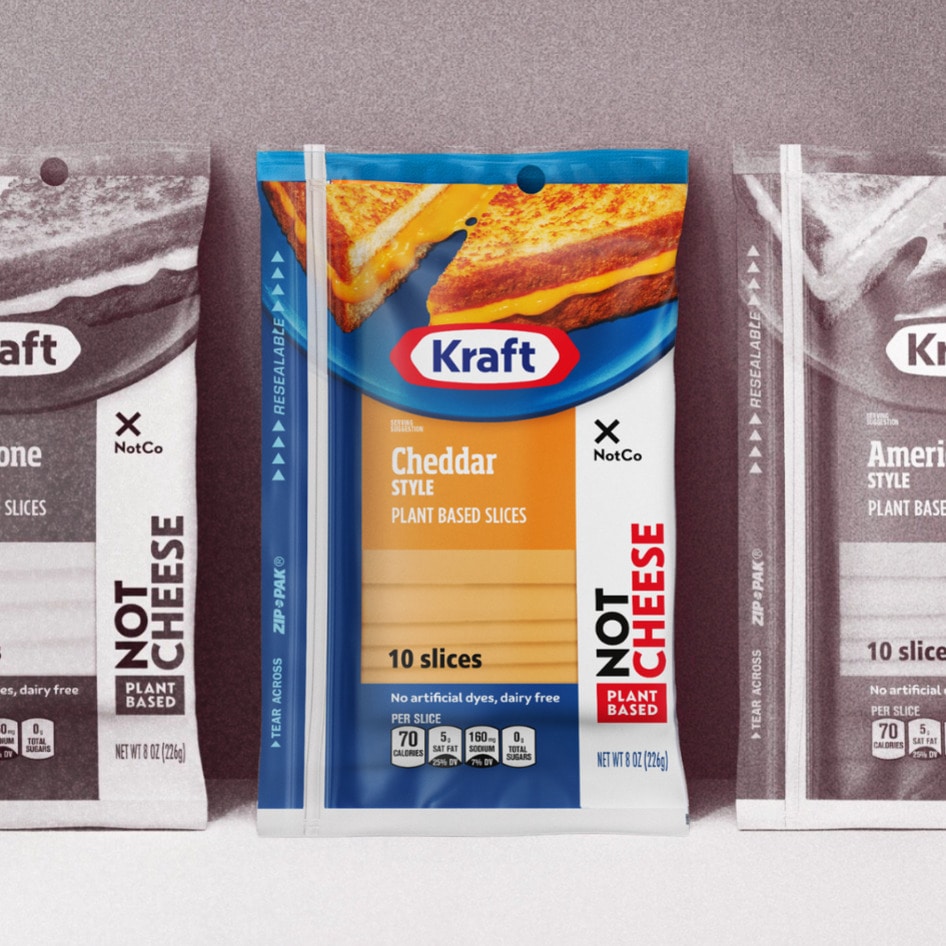Since April, Asheville, NC-based vegan meat company No Evil Foods has been embroiled in controversy over the way its management team handled a union organizing campaign earlier this year. The company’s pro-labor branding—which prominently features raised fists and uses socialist-themed product names—has become the subject of a slew of social media campaigns, articles, and memes condemning No Evil Foods for union-busting, a practice some are saying directly opposes the company’s mission and branding. Numerous media outlets have told the “evil” part of the story. To get the whole story, we spoke to both pro- and anti-union employees at the company, as well as No Evil Foods’ founders to find out how a mission-driven vegan meat company found itself in a heated labor battle.
The road to Walmart
In 2014, vegan couple Sadrah Schadel and Mike Woliansky founded No Evil Foods as a local vegan meat business, selling products such as “El Zapatista” chorizo, “Comrade Cluck” chicken, and “Pit Boss” BBQ pulled pork. By 2018, the company had expanded its distribution to national retailers such as Wegmans and Walmart, and by that fall, began to transition to a 16,000-square-foot facility (dubbed “The Axis”) as well as securing investment from venture capital firm Blue Horizon Ventures to accommodate its continued growth. By 2019, the company’s vegan meats were available at 5,000 stores nationwide.
Schadel and Woliansky founded No Evil Foods on principles that revolved around “doing no evil,” an idea that applies to reducing harm to farmed animals by providing vegan alternatives. The concept was also a tenet, the founders say, that was built into the company ethos in other ways, including providing its workers with a living wage (currently an average of $17 per hour), covering healthcare premiums, prioritizing paid time off and sick leave, and providing flexibility for working parents.
However, the company’s handling of its rapid expansion, some former employees say, sowed seeds of doubt in whether the founders would keep their promise to “do no evil.”
Union drive
In early 2020, a union drive began to form within the company, with workers organizing to join the United Food and Commercial Workers (UFCW) local 2018 labor union. In speaking with VegNews, several pro-union employees voiced that while the wages, benefits, and mission of No Evil Foods aligned with their needs, they felt that joining a union would help secure those benefits through a collective bargaining agreement.
Former production worker Jon Reynolds—a vegan excited to work in vegan meat manufacturing—was employed by the company for six months. “Turnover, especially among production workers, is ridiculously high, and I always believed the union would provide us with job security in a right-to-work state where it basically does not exist,” Reynolds said.
For some, the desire to join UFCW was sparked by a shift change that extended workers’ four-day Monday through Thursday schedule to a Monday through Friday workweek. Some former workers also claim that No Evil Foods failed to increase the number of employees and implement higher capacity equipment to accommodate its rapid growth. “We were also required to work a rotating Saturday each month, forcing everyone to work at least one six-day workweek per month,” Reynolds said. “These were just some of the issues that made me believe we needed union representation.”
Pro-union workers say that when management was tipped off to the union drive, No Evil Foods hired law firm Constangy, Brooks, Smith & Prophete—which, Reynolds says, is known for assisting companies in busting unions. As the union drive continued, management—including Schadel and Woliansky—held multiple, hours-long captive audience meetings, audio of which was leaked to Industrial Worker (the official publication of international union Industrial Workers of the World) in April. A former employee who wishes to be identified as “Scott” told VegNews that during the meetings, management would reiterate anti-union themes, leaving no room for questions and shutting down pro-union discussion. “It was a smear campaign against the union,” Scott said. “Nothing positive was said about the union or unionizing in general.
When employees would make pro-union arguments, they would be shut down pretty quickly. They passed out documents with cherry-picked information making employees believe the union was going to steal their money and go to SeaWorld with it. It was honestly horrible to sit through.”
Reynolds says that management told workers that joining a union would be akin to having a “shitty gym membership” and that sexual harassment would go unchecked, among other claims. According to Reynolds, the barrage of anti-union information repeated by management unduly influenced the results of the union election. “No Evil Foods hired a notorious union-busting law firm to provide management with anti-union talking points,” Reynolds said. “They plastered the warehouse with misleading, anti-union flyers while throwing pro-union flyers in the trash.”
Pro-union workers claim that management characterized UFCW Local 1208 as a “meatpacking union” that stands against the vegan company’s principles. While it is true that the union represents workers at meat giant Smithfield, it also represents workers in other industries, including grocery, retail, chemical, and cannabis. “I absolutely hate Smithfield,” Reynolds said. “Since moving to North Carolina, I have seen more trucks crammed to the brim with pigs than I ever wanted to see in my entire life. I would love to see Smithfield go out of business, but I don’t think that process should involve stripping workers of their protections. Factory farm workers often operate in dangerous conditions for ridiculously low pay, and unions can help alleviate some of those problems.”
On Feb. 13, following many of these captive-audience meetings, workers voted 15 to 43 against joining the UFCW local 1208. Complicated by the onset of COVID-19, what followed, Reynolds and Scott say, was a targeted termination of pro-union workers and organizers.
COVID-19 complications
A month after the union election, the COVID-19 pandemic struck. Faced with uncertainty, No Evil Foods gave workers 24 hours to make one of three decisions about their future with the company: resign with three weeks severance under the conditions that they do not speak to the media and are not allowed to work at No Evil Foods again; resign without severance but with the ability to return to No Evil Foods at a later date; or stay with the company—a decision which would be rewarded with a $1.50 per hour pay raise, or hazard pay, after 90 days of perfect attendance. At that time, approximately 13 percent of the workforce decided to resign. “Immunocompromised workers were put in a tight spot and ended up having no choice but to quit,” Reynolds said. The company’s COVID-19 conditions sparked a petition for immediate hazard pay without the condition of perfect attendance that was circulated online by pro-union organizer and No Evil employee Cortne Roche.
“The day before we were about to turn the petition in for hazard pay, I was pulled off the production floor by the head of human resources and asked about our organizing effort,” Reynolds said. “Knowing it would get back to management, I admitted the existence of a petition. The next day, before we could turn the petition in, management jumped in front of us, announced immediate hazard pay, and took credit for the idea.”
But that’s where the goodwill toward organizers ended, Reynolds says. “Not long after, the most legible signatures on the petition began getting fired for arbitrary reasons.”
Reynolds explained that a worker was fired for having a wallet in his pocket and Roche was terminated for wearing pants that were too short—pants she says she previously wore with no consequence. Reynolds was fired on May 1, he says, for “not taking social distancing seriously,” even though he says he was one of the loudest voices routinely pointing out that social distancing was not always possible given the nature of working in close quarters and operating machines where workers need to stand near each other. Both Reynolds and Scott said that some workers were subjects of ghost write-ups—where violations were only made known to employees by management during the termination process. “To fire organizers in a pandemic is pretty evil,” Scott said.
Management went on to implement a $2.25 per hour hazard pay raise indefinitely. Pro-union workers saw the hazard pay increase as a benefit that could be terminated at any time, while those that voted against the union understood the “indefinitely” statement to mean that hazard pay will last as long as it is needed—a semantics issue that illuminates the core of the controversy at the company.
“Every single positive thing about working at No Evil Foods could be taken away tomorrow without a union contract to solidify those good things,” Reynolds says.
“No evil,” management says
Speaking exclusively to VegNews, Schadel and Woliansky maintain that workers voted against the union in a free and fair election. “While we acknowledge the contributions of the labor movement to our society, we also know that not all unions are good, and we understand that’s an uncomfortable conversation for some,” the founders said in a joint statement. “In fact, the UFCW Local 1208 that would have represented our employees of our vegan company has a history of corruption, including local union leaders recently embezzling union dues for personal gain,” a reference to Keith Alan Ludlum—president of the UFCW Local 1208 union—who, in July, was sentenced to 14 months in jail and ordered to pay more than $200,000 in restitution after pleading guilty to embezzlement charges made after he used union fees to, among other things, fund trips to SeaWorld and purchase personal hunting equipment (such as coyote urine, deer attractant, and several guns).
No Evil Foods’ founders also contend that the transition to its new manufacturing facility was made without proper adjustment in workforce and machinery. A month prior to its move to The Axis, No Evil had 23 team members, and by the move in April 2019, the company had nearly 60 employees. Currently, it has more than 100 employees. “We also invested millions of dollars into equipment and infrastructure to improve our production process—and not just to make more plant meat, but to improve the kind of work that our team members are doing every day,” Schadel and Woliansky said. “But it didn’t happen overnight—it took time, testing, failing, and trying again to find the right solutions.”
As for its hiring of Constangy, Brooks, Smith & Prophete, Schadel and Woliansky say they did so to help them navigate a novel situation. “Like anyone faced with legal issues that are new to them, we engaged a law firm to help us understand the labor law and fully comply with it,” they said. “These unions are very well funded, and are represented by expert counsel, so we felt it necessary to retain outside counsel to help us navigate these complex issues.”
Workers against the union
In audio interviews obtained by VegNews, four current No Evil Foods employees who voted against the union explained that joining UFCW Local 1208 was unnecessary and counterproductive, all citing that the company ethos was familial and supportive.
Dexter Morgan, a production line worker who has been with the company for six months, explained that the founders have supported him throughout the birth of his first child and that he is pleased with perks such as family meals every Thursday and the company’s COVID-19 safety measures.
“Honestly, I feel like it’s one of the better, if not the best, jobs I’ve ever had and I’m not saying that just because of the pay but just because of the people. It’s like a family and I’ve never had that at no other job,” Morgan said.
He says he considered both sides during the union drive and felt that joining it was not to his benefit. “My decision was based on how I was being treated and how I felt at the job as a company, and I felt like they hadn’t mistreated us. They listen to us. They take our ideas into consideration and even use them,” Morgan said. “As far as I hear what a union does is make sure we are taken care of, and I felt like we didn’t need a union. We still don’t.”
Brandy Bailey, a production line worker, echoed Morgan’s sentiments and voted against the union for similar reasons. “There was a lot of information coming from both sides,” she said. “One of the reasons that I made the call that I did was because I do feel like our voice is heard there and it matters … I’m glad that we went with no union.”
Asheville transplant Bailey Burgwyn, who also works in production, has been a No Evil employee for more than a year and joined the company as a fan of its products. During the union drive, Burgwyn was skeptical about joining UFCW local 1208. “The more I understood it and read about it … I was more interested in having the company be successful and [for me to be] able to stay in Asheville working for a company that I love than bringing on a union that I didn’t know would be beneficial or not,” Burgwyn said. “To me, it was like rolling dice.”
Seth Wilhite, an anti-union organize, two-year production worker, and manager at No Evil Foods, described what he has witnessed as the company grew. “I feel like we’ve grown as a family together and gotten to know each other a lot more,” he said, adding that management has been accommodating to his schedule, letting him take six Fridays off in order to drive his grandmother to cancer treatments.
“I feel like I have a family at No Evil,” he said. “They back the same morals I do.”
During the union drive, Wilhite doubted the motivations of the pro-union organizers. “A lot of them were against us being in Walmart,” Wilhite said. “But there are a lot of food-locked places that the only place people could get vegan plant meat would be a Walmart.” Wilhite represented the company the day of the union election and recalls hugging two pro-union workers, including Reynolds, as the results came in (though Reynolds denies this ever happened). “I just see No Evil as a family and as united already. I’ve never felt like I’ve needed a third party to speak up for me,” Wilhite said. “I feel like we are a union of No Evil employees.”
Post-election
Following the union election, Instagram accounts have launched (under names including @soevilfoods, @moevil, and @moevilfoods2—many of which have been repeatedly shut down, so handles frequently change) to publicly condemn No Evil Foods on how it handled the union drive. Many of the posts point to the company’s pro-labor branding as hypocritical. “To use the raised fist, the word ‘comrade,’ and the name El Zapatista definitely would have any educated consumer thinking No Evil Foods would be pro-union,” Scott said. “No Evil Foods is guided by its investment board, not its love for its team.”
Since 2018, No Evil Foods has donated one percent of its sales—for a total of approximately $10,000—to support grassroots organization Schools for Chiapas, which works to empower the indigenous Zapatista communities in Chiapas, Mexico. As the online criticisms began to grow, the Schools for Chiapas publicly denounced its affiliation with the company on Twitter.
Wilhite said that “it seems fishy” that his fellow workers would choose a union that represents meatpackers, and posited that former employees were behind the social media posts. “These same people are slandering the company online,” Wilhite said. “I feel like they’re less for a union and just trying to shut down No Evil. That, to me, is just them trying to attack my friends and family.”
The No Evil Foods founders also suspect nefarious motives behind the social media backlash. “Since the February election, these unions and their operatives have refused to accept the vote and will of our employees,” they said. “They have poured big union money into a non-stop coordinated campaign of harassment and extortion against us, our family, our team, and our company, including disseminating slanderous, libelous statements about us and our team, purchasing expensive digital ads to confuse and misdirect consumers to fake websites, [and] harassing our customers on social media.” In some cases, Schadel and Woliansky allege that these operatives have even encouraged others to endanger their lives and the safety of their young children—although former employees explicitly deny these claims.
The road ahead
As No Evil Foods’ operations return to a new normal, Reynolds hopes that management can learn from the experience of the union drive. “I would really like to see No Evil Foods change course and do the right thing,” Reynolds said. “I’d love for them to acknowledge mistakes were made, offer to rehire the workers they fired for organizing activities, and help their workers organize.”
Reynolds and Roche filed unlawful termination complaints against No Evil Foods with the National Labor Relations Board, both of which are currently under review. “I don’t think we can be vegan and simultaneously not care about the rights of workers,” Reynolds said. “No Evil Foods could have taken a truly revolutionary direction and set a precedent for other plant meat companies to unionize; instead, they hired union avoidance consultants, subjected us to anti-union meetings, and then later retaliated against workers who ultimately just wanted job security and a union contract to solidify all of the things they loved about working at No Evil Foods.”
Schadel and Woliansky plan to move forward from the controversy by doubling-down on their aspiration to do no evil. “Everyone makes mistakes. Learning from them is essential. Striving to do better is what ‘No Evil’ is all about,” the founders said.
“Our name is aspirational, and every morning, we get up and try again—try to learn, to be better, to make the right choices, to do the right thing, to help make the world a better place for people and animals alike. And as vegans, we will continue to fight against those who seek to shut us down—the mission that drives us is too important, our food is too delicious, and our fight to preserve the planet and eliminate animal cruelty is too important.”
JUMP TO ... Latest News | Recipes | Guides | Health | Subscribe







